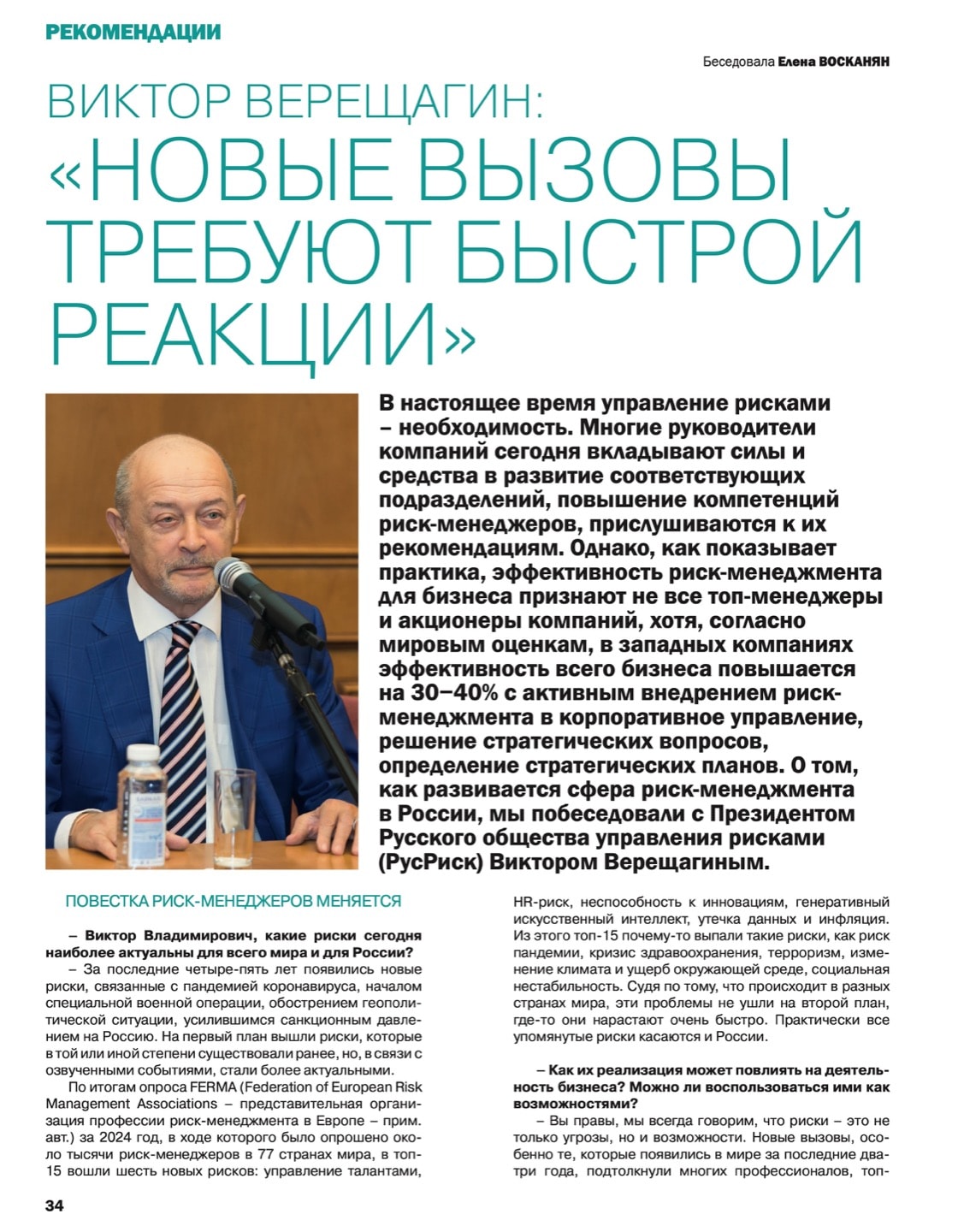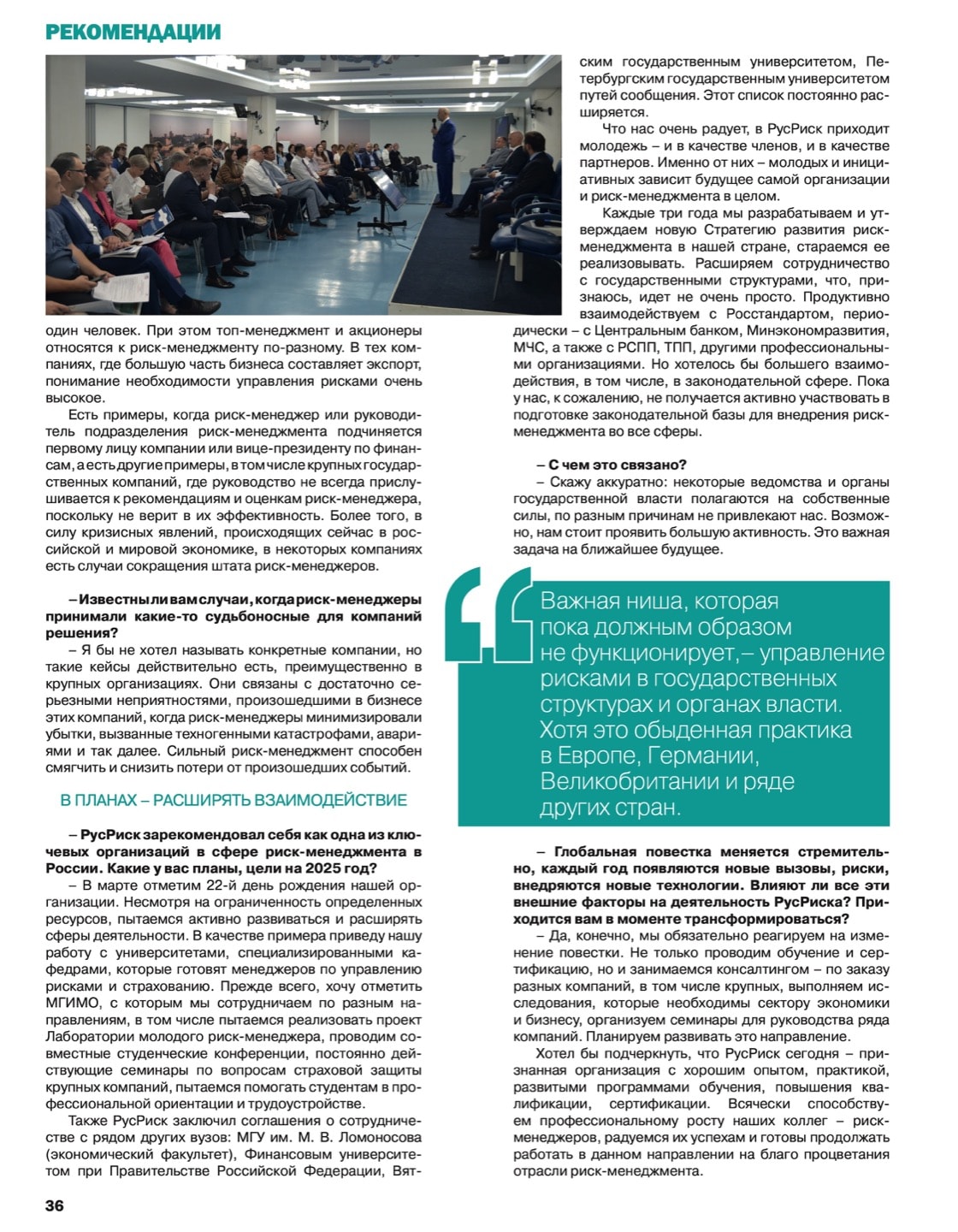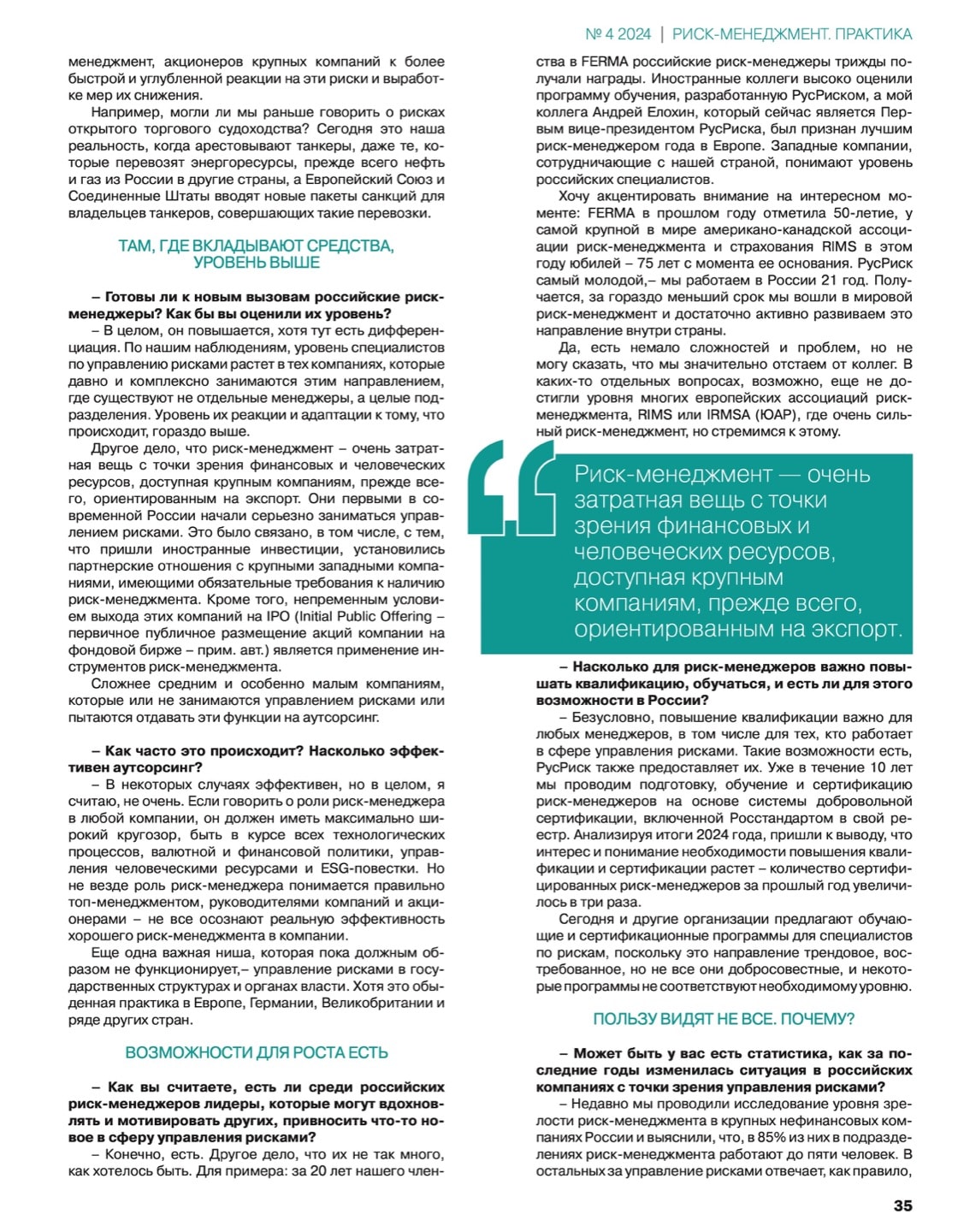Interview of the President of RusRisk for the magazine “Risk Management. Practice”



Text version of the interview:
Today, risk management is a necessity. Many company leaders are investing time and resources in developing dedicated units, upgrading risk managers’ competencies, and listening to their recommendations. However, as practice shows, not all top managers and shareholders recognize the effectiveness of risk management for business, even though, according to global assessments, in Western companies overall business performance increases by 30–40% with the active integration of risk management into corporate governance, strategic decision‑making, and strategic planning. We discussed how the field of risk management is developing in Russia with the President of the Russian Risk Management Society (RusRisk), Victor Vereshchagin.
THE RISK MANAGERS’ AGENDA IS CHANGING
– Victor Vladimirovich, which risks are currently most relevant for the world and for Russia?
– Over the past four to five years, new risks have emerged related to the coronavirus pandemic, the start of the special military operation, the escalation of the geopolitical situation, and increased sanctions pressure on Russia. Risks that existed to some extent before have come to the fore and become more relevant due to these developments.
According to the 2024 FERMA survey (Federation of European Risk Management Associations — the representative organization of the risk management profession in Europe), which polled about a thousand risk managers in 77 countries, six new risks entered the top‑15: talent management, HR risk, inability to innovate, generative artificial intelligence, data leakage, and inflation. For some reason, such risks as pandemic risk, healthcare crisis, terrorism, climate change and environmental damage, and social instability fell out of this top‑15. Judging by what is happening in different countries, these issues have not moved to the background; in some places they are growing very rapidly. Almost all of the above risks also affect Russia.
– How might their materialization affect business activities? Can they be leveraged as opportunities?
– You are right; we always say that risks are not only threats but also opportunities. New challenges, especially those that have emerged globally over the past two to three years, have prompted many professionals, top management, and shareholders of large companies to react more quickly and deeply to these risks and to develop mitigation measures.
For example, could we previously talk about risks in open merchant shipping? Today this is our reality: tankers are being seized, even those transporting energy resources — primarily oil and gas — from Russia to other countries, while the European Union and the United States are introducing new sanctions packages for tanker owners making such deliveries.
WHERE INVESTMENT FLOWS, CAPABILITY GROWS
– Are Russian risk managers ready for the new challenges? How would you assess their level?
– Overall, it is improving, although there is differentiation. In our observation, the level of risk management specialists is growing in companies that have long and comprehensively worked in this area, where there are entire departments rather than individual managers. Their capacity to react and adapt to what is happening is much higher.
At the same time, risk management is very resource‑intensive in terms of finances and human resources, and is mainly accessible to large companies, especially those oriented toward exports. They were the first in modern Russia to seriously engage in risk management. This was partly due to the arrival of foreign investment and the establishment of partnerships with large Western companies that have mandatory risk management requirements. Furthermore, implementing risk management tools is a prerequisite for companies going public at IPO (Initial Public Offering).
It is more difficult for medium‑sized and especially small companies, which either do not engage in risk management or try to outsource these functions.
– How often does this happen? How effective is outsourcing?
– In some cases it is effective, but overall, in my view, not very. Speaking about the role of a risk manager in any company, this person must have a maximally broad outlook, be aware of all technological processes, currency and financial policy, human resource management, and the ESG agenda. Yet the role of a risk manager is not correctly understood everywhere by top management, company leaders, and shareholders — not everyone recognizes the real effectiveness of strong risk management within a company.
Another important area that is not yet functioning properly is risk management in government institutions and public authorities. Although this is common practice in Europe, Germany, the UK, and a number of other countries.
THERE ARE OPPORTUNITIES FOR GROWTH
– In your opinion, are there leaders among Russian risk managers who can inspire and motivate others and bring something new to the field?
– Of course. Another matter is that there are not as many as we would like. For example, over 20 years of our membership in FERMA, Russian risk managers have received awards three times. Our international colleagues highly appreciated the training program developed by RusRisk, and my colleague Andrey Elokhin, who is now the First Vice President of RusRisk, was recognized as Europe’s Risk Manager of the Year. Western companies cooperating with our country understand the level of Russian specialists.
I would like to highlight an interesting point: FERMA celebrated its 50th anniversary last year, and the largest US‑Canadian risk management and insurance association, RIMS, celebrates its 75th anniversary this year. RusRisk is the youngest — we have been operating in Russia for 21 years. It turns out that in a much shorter period, we have joined the global risk management community and are actively developing this area within the country.
Yes, there are many difficulties and problems, but I cannot say that we are significantly behind our colleagues. In certain areas, we may not yet have reached the level of many European risk management associations, RIMS, or IRMSA (South Africa), where risk management is very strong, but we are striving for it.
Risk management is very resource‑intensive in terms of finances and human resources and is mainly accessible to large companies, especially those focused on exports.
– How important is continuing education and training for risk managers, and are there opportunities for this in Russia?
– Undoubtedly, professional development is important for any managers, including those working in risk management. Such opportunities exist, and RusRisk provides them as well. For 10 years, we have been conducting training and certification of risk managers under a voluntary certification system included in the Rosstandart register. Analyzing the results of 2024, we concluded that interest in and understanding of the need for professional development and certification are growing — the number of certified risk managers tripled last year.
Today, other organizations also offer training and certification programs for risk specialists, since this area is trendy and in demand, but not all of them are conscientious, and some programs do not meet the required level.
NOT EVERYONE SEES THE BENEFIT — WHY?
– Do you have statistics on how the situation in Russian companies has changed in recent years from the risk management perspective?
– We recently conducted a study of risk management maturity in large non‑financial companies in Russia and found that in 85% of them, risk management departments have up to five employees. In the rest, risk management is typically the responsibility of one person. At the same time, top management and shareholders treat risk management differently. In companies where exports constitute a large share of the business, understanding the need for risk management is very high.
There are cases where the risk manager or the head of the risk management department reports directly to the company’s top executive or the VP of Finance, and there are other cases — including in large state‑owned companies — where leadership does not always heed the recommendations and assessments of the risk manager because they do not believe in their effectiveness. Moreover, due to the current crises in the Russian and global economies, some companies have reduced their number of risk managers.
– Are you aware of cases where risk managers made pivotal decisions for companies?
– I would prefer not to name specific companies, but such cases do exist, primarily in large organizations. They are associated with significant adverse events in these companies’ businesses, when risk managers minimized losses caused by technological disasters, accidents, and so on. Strong risk management can cushion and reduce losses from such events.
PLANS — EXPANDING COOPERATION
– RusRisk has established itself as one of the key organizations in the field of risk management in Russia. What are your plans and goals for 2025?
– In March, we will celebrate the organization’s 22nd anniversary. Despite limited resources, we are striving to actively develop and expand our areas of activity. As an example, consider our work with universities and specialized departments that train managers in risk management and insurance. First of all, I would like to highlight MGIMO, with which we cooperate in various areas, including an attempt to implement the Young Risk Manager Laboratory project, holding joint student conferences, ongoing seminars on the insurance protection of large companies, and helping students with career guidance and employment.
RusRisk has also signed cooperation agreements with several other universities: Lomonosov Moscow State University (Faculty of Economics), the Financial University under the Government of the Russian Federation, Vyatka State University, and St. Petersburg State Transport University. This list is constantly expanding.
What makes us particularly happy is that young people are coming to RusRisk — both as members and as partners. The future of the organization and of risk management as a whole depends on them — the young and proactive.
Every three years, we develop and approve a new Strategy for the Development of Risk Management in our country and strive to implement it. We are expanding cooperation with government bodies, which, admittedly, is not very easy. We work productively with Rosstandart, and periodically with the Central Bank, the Ministry of Economic Development, the Ministry of Emergency Situations, as well as with the Russian Union of Industrialists and Entrepreneurs, the Chamber of Commerce and Industry, and other professional organizations. But we would like more interaction, including in the legislative sphere. So far, unfortunately, we have not been able to actively participate in preparing the legislative framework for implementing risk management across all areas.
– What is the reason for this?
– To put it carefully: some departments and public authorities rely on their own resources and, for various reasons, do not involve us. Perhaps we should be more proactive. This is an important task for the near future.
An important area that is not yet functioning properly is risk management in government institutions and public authorities. Although it is routine practice in Europe, Germany, the UK, and several other countries.
– The global agenda is changing rapidly; new challenges and risks emerge every year, and new technologies are being introduced. Do these external factors affect RusRisk’s activities? Do you have to transform on the fly?
– Yes, of course, we respond to changes in the agenda. We not only conduct training and certification, but also provide consulting — at the request of various companies, including large ones, we carry out studies needed by sectors of the economy and business, and we organize seminars for the leadership of a number of companies. We plan to develop this area.
I would like to emphasize that RusRisk today is a recognized organization with solid experience, practice, and well‑developed training, professional development, and certification programs. We actively support the professional growth of our colleagues — risk managers — take pride in their successes, and are ready to continue working to promote the prosperity of the risk management industry.